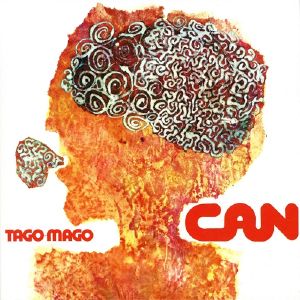
- Format: MP3

Size: 145 MB
Bitrate: 256
mp3
Ripped by: ChrisGoesRock
Artwork Included
Source: Japan Blue-Spec Remaster
Tago Mago is the third studio album by the German experimental rock band Can, and was originally released as a double LP in 1971 by United Artists. It was the band's first studio album to feature Kenji "Damo" Suzuki after their previous vocalist, Malcolm Mooney, quit the band in 1970 after having a nervous breakdown. The album was remastered and released as a SACD in September 2004, and included commentary from former Melody Maker journalist David Stubbs and Bobby Gillespie of Primal Scream.
Tago Mago has been described as Can's most extreme record in terms of sound and structure. The album has received much critical acclaim since its release and has been cited as an influence by various artists.
Julian Cope wrote in Krautrocksampler that Tago Mago "sounds only like itself, like no-one before or after", and described the lyrics as delving "below into the Unconscious". Tago Mago finds Can changing to a jazzier and more experimental sound than previous recordings, with longer instrumental interludes and less vocals; this shift was caused by the dramatic difference between Suzuki and the band's more dominant ex-singer Mooney. On the album, Can took sonic inspiration from sources as diverse as jazz musicians such as Miles Davis and from electronic avant-garde music. The album was also inspired by the occultist Aleister Crowley, which is reflected through the dark sound of the album as well as being named after Isla de Tagomago, an island which features in the Crowley legend. Czukay reflects that the album was "an attempt in achieving a mystery musical world from light to darkness and return". The group has referred to the album as their "magic record". The tracks have been described as having an "air of mystery and forbidden secrets". Tago Mago is divided into two LPs, the first of which is more conventional and structured and the second more experimental and free-form.
"Paperhouse", the opening track, is one of the shorter songs on the album. Allmusic critic Ned Raggett depicted the song as "beginning with a low-key chime and beat, before amping up into a rumbling roll in the midsection, then calming down again before one last blast," and Dominique Leone, writing for Pitchfork Media, commented on the "gray, faintly ominous" mood of the piece.[15] "Mushroom" is the following track, which Leone noted as having a darker sound than the previous song. As Piero Scaruffi wrote, "Suzuki's psychodrama in Mushroom is set in a rarefied atmosphere of skitting drums, booming bass and atonal guitar." "Oh Yeah" and "Halleluhwah" contain the elements that have been referred to as Can's "trademark" sound: "Damo Suzuki's vocals, which shift from soft mumbles to aggressive outbursts without warning; Jaki Liebezeit's mantric drumming; Holger Czukay's production manipulations (e.g. the backwards vocals and opening sound effects on 'Oh Yeah')." Both "Oh Yeah" and "Halleluhwah" emphasize repetitive grooves.
The second LP features Can's more avant-garde efforts, with Roni Sarig, author of The Secret History of Rock calling it "as close as it ever got to avant-garde noise music." Featuring Holger Czukay’s tape and radio experiments, the tracks "Aumgn" and "Peking O" have led music critics to write that Tago Mago is Can's "most extreme record in terms of sound and structure." "Aumgn" features keyboardist Irmin Schmidt chanting rather than Suzuki's vocals. The closing track, "Bring Me Coffee or Tea", is a much shorter track than the ones before it ("Mushroom" being the only exception) and was described by Raggett as a "coda to a landmark record." Piero Scaruffi depicted it as "basically a delirious hare-krishna chant for loose rock quintet, [pretending] to link the album to the contemporary fad of Eastern-tinged psychedelia."
01. "Paperhouse" 7:28
02. "Mushroom" 4:03
03. "Oh Yeah" 7:23
04. "Halleluhwah" 18:32
05. "Aumgn" 17:37
06. "Peking O" 11:37
07. "Bring Me Coffee or Tea" 6:47